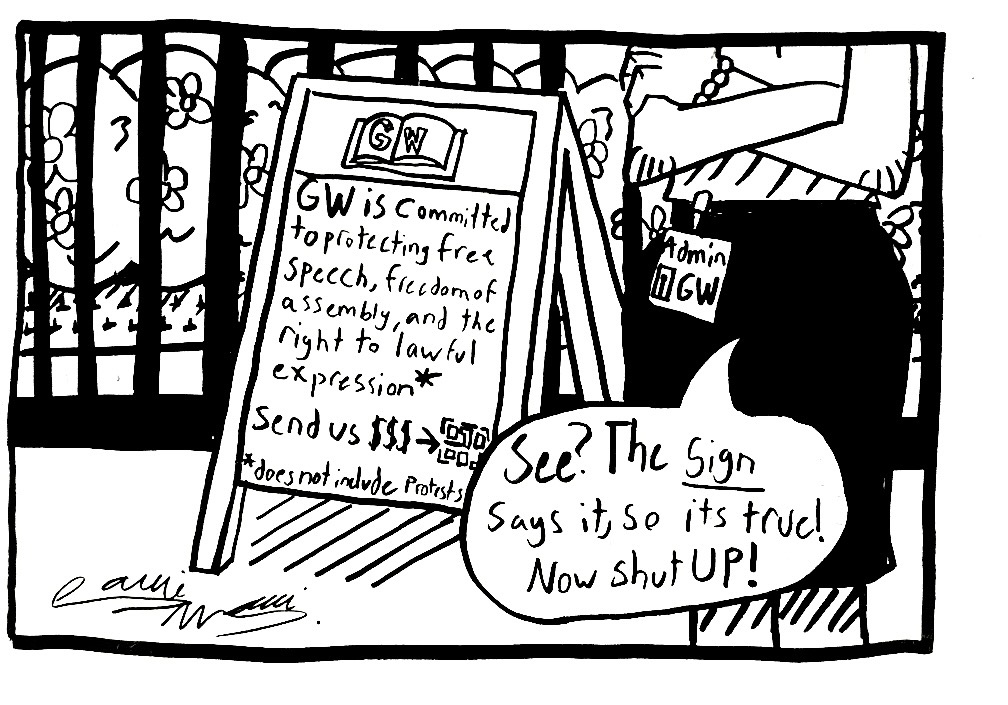Amr Madkour is an assistant professor of obstetrics and gynecology in the School of Medicine and Health Sciences.
While we have not had the opportunity to meet, I would like to welcome you to GW, University President Ellen Granberg.
I have had the privilege of serving as faculty in the School of Medicine and Health Sciences for over 10 years now in the Department of Obstetrics and Gynecology. I have family in the Gaza Strip — my grandfather is from Khan Younis, and many of our extended family have been killed by Israel’s bombing campaign. I have been watching the responses coming from the University, and your office in particular, with much anticipation given the gravity of the moment in which we find ourselves. Indeed, I do not think it an exaggeration to say we are at a historic time that will shape the legacies of people, institutions and nations to come.
What I have observed from the Office of the President has been deeply disappointing. In your Oct. 11 statement, you condemned the acts of Hamas in no uncertain terms. I have yet to see one official statement from anyone in the University condemning the acts perpetrated against innocent Palestinians by the state of Israel — not a single comment about the collective punishment against the people of Gaza through starvation, indiscriminate bombing, destruction of vital infrastructure and displacing an already displaced people.
I am horrified by the scenes of hospitals being shelled, deprived of the resources needed to care for the injured, and the recent deaths of babies in the Al-Shifa Hospital’s neonatal intensive care unit because of the lack of fuel to keep incubators running.
And as of Tuesday, I am dismayed to hear of the recent restrictions the University has placed on Students for Justice in Palestine at GWU. Censoring the voices of SJP or any supporters of Palestinians because of how others may interpret our message is a grave mistake. We are witnessing the undermining of a core constitutional right in this country, an essential element of campus life, and one of the few democratic institutions left to send that message to our leaders and politicians. While I am not in contact with nor coordinate with SJP, I fully support their efforts to speak out.
I am deeply concerned about the emerging trend that appears to discriminate against Palestinians in official University statements and the demonization of slogans used by SJP to justify its exclusion under the guise of enforcing University policies. When you silence Palestinians and their supporters at GW for statements such as “glory to our martyrs,” claiming they are celebrations of terrorism and antisemitic, this is akin to the uncritical acceptance by the mainstream media and individuals of the unsubstantiated claims of beheaded babies and mass rape because they reinforce the most heinous Islamophobic tropes of subhuman savagery and barbarism. You are implying you also accept these tropes.
Martyrdom is essential to the religion of Islam and the psyche of Muslims and Palestinians. Celebrating these terms is part of our faith and our story. Indeed, they are integral to many religions and a comfort for those aghast at the scenes of atrocities coming out of Gaza and struggling to understand the apathy of our politicians and leaders. If you are unfamiliar, I would urge you to learn from us what these and similar terms mean.
To silence such expressions is to silence a community. It is to tell them they do not have the same voice as others and that their lives and pain are not worth the same as others. You have shown by these examples that there are some things we cannot talk about, that you will not acknowledge or permit us to talk about.
Palestinians and their supporters have a right to express their support for resistance against the occupation, their mourning for those killed in this bombardment, and to resist the dehumanizing and discriminatory environment emerging around them.
That environment has resulted in a student and faculty body that is suffering two blows. First, the pain we feel for our fellow human beings in Gaza, who continue to face a genocide enabled by our government. Second, the feeling of being betrayed by our community and uncertain in our place here.
I do not call on you to speak out against the atrocities in Gaza. It is obvious to anyone paying attention that this is a genocide. I do not call on you to demand a ceasefire, though perhaps you believe assassinating Hamas fighters justifies killing more than 11,000 Palestinians, more than 4,500 of whom are children.
What I do call for is for you not to interfere with the free expression of voices affected by the plight of Palestinians. Meet with students who are disillusioned, marginalized and who have seen censorship and retaliation against those calling for an end of injustice against Palestinians. Demonstrate that equity, human rights and the freedom of expression are not merely the ideological tools of imperialism to be deployed selectively but truly universal values.


